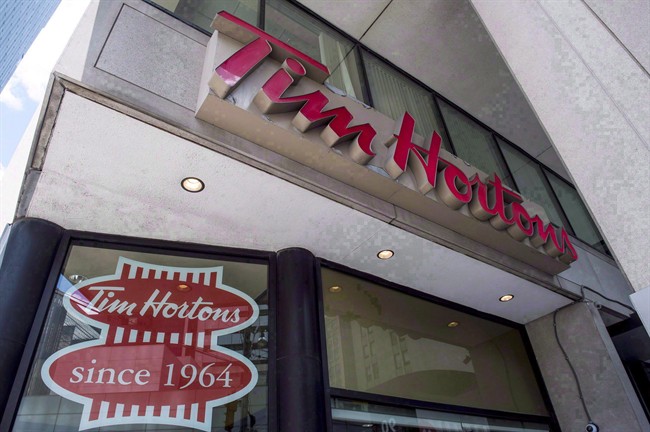Some Tim Hortons franchisees have responded to Ontario’s new minimum wage by clawing back employee benefits, sparking backlash from their parent company and Premier Kathleen Wynne, as well as some concerned consumers who are participating in a boycott of the coffee-and-doughnut chain.

Here’s a look at the numbers behind the controversial measures that have some of the franchisees and the parent company playing the blame game:
$2.40: The jump in minimum wage in Ontario for most employees starting Jan. 1. It is set to go up another $1 at the start of 2019.
$243,889.10: How much the increase will cost the average Tim Hortons franchisee, according to the Great White North Franchisee Association, a group representing about half of the country’s Tim Hortons franchisees.
The calculation assumes every employee’s hourly wage is boosted by $3.35, which includes the $2.40 minimum wage hike and factors in additional costs from other changes to the province’s employment and labour laws, like increased vacation pay.
WATCH: Tim Hortons parent company calls franchisees complaining about minimum wage ‘rogue’

This figure would vary depending on the mix of full- and part-time employees at a particular store, said a GWNFA spokeswoman in an email.
The association does not yet have a projection for what the average franchisee will lose a year when Ontario’s minimum wage rises to $15 an hour in 2019.
$6,968.26: How much more each full-time employee who works 40 hours a week will cost a Tim Hortons franchisee every year, according to the GWNFA.
10 cents: How much the parent company of Tim Hortons, Restaurant Brands International, raised the price of a cup of coffee by on average at its Canadian locations in 2014. At the time, it also boosted the price of breakfast sandwiches by a dime in all provinces except Ontario.
Since then, it has only raised the price of menu items infrequently. Most recently, on Aug. 2, 2017, some restaurants in select markets increased prices for some hot beverages and breakfast menu items, Tim Hortons said at the time.
The GWNFA said some of its franchisee members have been left with no alternative but to implement cost-saving measures, like cutting some employee benefits, to survive as RBI has not helped them by raising menu prices or taking other measures.
WATCH: Protest planned at Tim Hortons in Cobourg

Tim Hortons said it’s committed to helping franchisees work through the employment law changes.
10 cents is also how much a cup of coffee cost when the chain was founded in 1964. At the time, a doughnut also cost a dime.
$1.5 million: The required net worth of anyone applying to purchase a Tim Hortons franchise, according to the company’s website. Applicants must have an additional $500,000 in liquid assets to qualify.
4,613 restaurants: The number of Tim Hortons locations in Canada as of Dec. 31, 2016, according to the company’s most recent annual report. Only 29 of these were owned by the company, while 4,584 were franchised.
- Life in the forest: How Stanley Park’s longest resident survived a changing landscape
- Bird flu risk to humans an ‘enormous concern,’ WHO says. Here’s what to know
- Roll Up To Win? Tim Hortons says $55K boat win email was ‘human error’
- Mental health support still lacking 4 years after mass shooting: Nova Scotia mayor



Comments